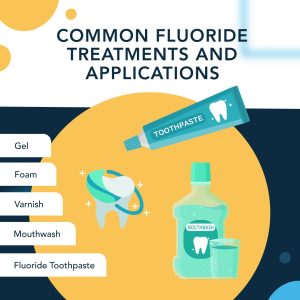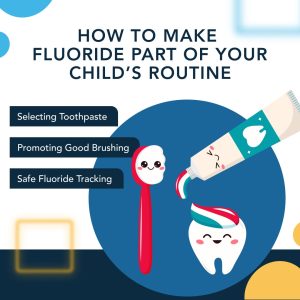Fluoride plays a key role in keeping teeth strong and healthy at every stage of life. Found in toothpaste, drinking water, and professional dental treatments, fluoride helps prevent cavities by strengthening enamel and reducing the effects of harmful bacteria. In this article, we’ll explore how fluoride works, why it’s important, and how to safely include it in your daily dental routine.
What Is Fluoride?
Fluoride is a natural mineral found in water, soil, and certain foods. It’s widely used in dental care because of its proven ability to protect teeth and reduce the risk of cavities. You’ll commonly find fluoride in toothpaste, mouthwash, and even in community water supplies, where it plays an important role in supporting oral health across all ages.
What Does Fluoride Do?
Fluoride works by strengthening tooth enamel, which is the outer protective layer of your teeth. It helps repair early signs of tooth decay and makes enamel more resistant to acid attacks from bacteria and sugary foods. Regular exposure to fluoride, whether through brushing, drinking water, or professional treatments, can significantly lower the risk of cavities and promote long-term dental health.
Common Fluoride Treatments and Applications
Fluoride can be applied in several ways to help protect teeth and prevent cavities. From daily products like toothpaste to in-office treatments, each method offers unique benefits. Understanding the different fluoride options can help you and your dentist choose the best approach for maintaining strong, healthy teeth at every stage of life.
Varnish
Fluoride varnish is a highly concentrated fluoride coating that a dentist applies directly to the teeth. It hardens quickly and provides long-lasting protection, especially for children or patients at higher risk of cavities. Varnish is a quick, painless procedure often used during routine dental checkups as part of preventive care.
Gel
Fluoride gel is typically applied in a dental office using a tray that fits over your teeth. It contains a high concentration of fluoride and is left in place for a few minutes. This treatment is effective for strengthening enamel and is commonly recommended for patients prone to tooth decay or sensitivity.
Foam
Fluoride foam is a lightweight alternative to gel, applied using a tray during a professional dental visit. Its airy texture helps it coat the teeth evenly and comfortably. Foam is ideal for children or patients with a sensitive gag reflex, offering a quick, effective way to strengthen enamel and reduce cavity risk.
Fluoride Toothpaste
Fluoride toothpaste is a simple, everyday tool for cavity prevention. Brushing twice a day with fluoride toothpaste helps strengthen enamel, repair early signs of decay, and keep your breath fresh. It’s safe and effective for both kids and adults, making it a key part of any consistent oral hygiene routine.
Mouthwash
Fluoride mouthwash provides added protection against cavities by coating the teeth after brushing and flossing. It’s especially helpful for those with a high risk of decay, braces, or dry mouth. Used regularly, fluoride rinses help strengthen enamel and support a cleaner, healthier mouth between dental visits.
Community Drinking Water
Many public water systems include fluoride to help reduce tooth decay across entire communities. Drinking fluoridated water every day provides a consistent, low-level exposure that helps strengthen enamel and protect against cavities. It’s a safe and effective way to improve oral health on a population-wide scale.
At-Home Fluoride Use
Using fluoride at home is an easy way to support daily cavity prevention. Products like fluoride toothpaste, mouthwash, and prescription-strength rinses help strengthen enamel between dental visits. Your dentist may also recommend custom trays or supplements if you need extra protection. Consistent at-home use can make a big difference in long-term oral health.
The Importance of Fluoride in Childhood Dental Care
Fluoride plays a crucial role in developing strong, healthy teeth during childhood. From protecting baby teeth to aiding in the formation of permanent teeth, it supports long-term oral health. Regular fluoride exposure through toothpaste, water, or dental treatments helps children avoid decay, build strong enamel, and establish lifelong habits for a healthier smile.
Protecting Baby Teeth
Although baby teeth are temporary, they’re essential for chewing, speaking, and guiding permanent teeth into place. Fluoride helps protect these early teeth from decay by strengthening enamel and reducing acid damage. Keeping baby teeth healthy prevents pain, infections, and early tooth loss, all of which can affect a child’s comfort and dental development.
Supporting New Tooth Growth
As new teeth emerge, fluoride supports their development by making enamel more resistant to decay from the start. Regular fluoride exposure, especially during early childhood, helps ensure that permanent teeth grow in stronger and better protected. This early support can reduce the risk of cavities and lead to fewer dental problems as children grow.
Strengthening Enamel
Fluoride helps harden enamel, making teeth more resistant to daily acid attacks from sugary foods and bacteria. This is especially important for children, whose enamel is still forming and more vulnerable to decay. Strong enamel offers lasting protection and reduces the likelihood of cavities, fillings, or early tooth damage.
Reducing Dental Anxiety
By preventing cavities and toothaches, fluoride can help children avoid painful dental procedures, which often cause anxiety. When kids have fewer dental issues, visits to the dentist become quicker and more positive. This builds trust and comfort, encouraging regular checkups and promoting a healthier relationship with dental care over time.
Supporting Healthy Gums
Fluoride not only protects teeth but also contributes to overall oral health, including the gums. Healthy teeth are easier to keep clean, which helps prevent inflammation and irritation along the gumline. Early fluoride use supports better brushing habits and helps kids maintain a cleaner mouth and healthier gums as they grow.
Preventing Cavities
Fluoride is one of the most effective tools for preventing cavities in children. It helps stop early signs of tooth decay and strengthens enamel to protect against future damage. Kids who receive regular fluoride, whether through toothpaste, water, or dental treatments, are significantly less likely to develop cavities and require restorative dental work.
Tooth Loss Process
As children lose baby teeth and permanent teeth begin to erupt, fluoride helps protect both sets during this transition. It minimizes decay on remaining baby teeth and supports the healthy development of new ones. This keeps the mouth in better balance and ensures a smoother, healthier tooth loss and growth process.
How to Make Fluoride Part of Your Child’s Routine
Integrating fluoride into your child’s daily routine is a simple and effective way to protect their teeth from cavities. With the right products and guidance, fluoride use can become a natural part of their oral hygiene habits. From choosing the right toothpaste to monitoring overall fluoride intake, small steps can make a big difference in dental health.
 Choosing the Right Toothpaste
Choosing the Right Toothpaste
When choosing a toothpaste, select a fluoride toothpaste that’s age-appropriate and approved by dental professionals. For young children, use a smear the size of a grain of rice; for kids over three, a pea-sized amount is enough. Look for products with the ADA Seal of Acceptance to ensure they meet safety and effectiveness standards for strengthening enamel and preventing cavities.
Encouraging Good Brushing Habits
It’s important to help your child develop strong brushing habits by making it fun and consistent. Brush together, use a timer or a favorite song, and offer gentle guidance. Encourage brushing twice a day for two minutes using fluoride toothpaste. Positive routines and supervision help children build healthy habits that protect their teeth and keep their smile strong.
Tracking Fluoride Exposure Safely
While fluoride is essential for preventing cavities, it’s important to monitor how much your child is getting. Consider all sources, including toothpaste, drinking water, and any supplements. Your dentist can help evaluate whether your child’s intake is appropriate for their age and needs, ensuring they receive enough fluoride without exceeding recommended levels.
When to Talk to a Pediatric Dentist About Fluoride
A pediatric dentist can help you make informed choices about your child’s fluoride needs based on age, oral health, and risk of cavities. Whether you have questions about fluoride use or your child is experiencing dental concerns, professional guidance ensures safe and effective care tailored to your child’s specific smile and stage of development.
First Dental Visit
Your child’s first dental visit, ideally by their first birthday, is the perfect time to talk about fluoride. The dentist can assess your child’s cavity risk, recommend fluoride toothpaste or treatments, and guide you on proper use. Early advice helps you create healthy routines that protect baby teeth and support strong enamel as permanent teeth come in.
Concerns About Fluoride Exposure
If you’re unsure how much fluoride your child is getting, or if you’re worried they may be getting too much, a pediatric dentist can help. They’ll consider factors like toothpaste use, drinking water, and dietary supplements. With professional input, you can safely balance fluoride intake and protect your child from both cavities and overexposure.
Frequent Cavities Despite Brushing
If your child is brushing regularly but still developing cavities, it may be time to discuss fluoride treatments. A pediatric dentist can evaluate your child’s oral hygiene, enamel strength, and cavity risk. They may recommend professional fluoride applications or prescription-strength toothpaste to help improve protection and reduce the likelihood of future decay.
Signs of Early Decay or Weak Enamel
White spots, sensitivity, or areas of discoloration on your child’s teeth may indicate early enamel breakdown. These are often early warning signs of cavities or weak enamel. A pediatric dentist can examine these symptoms and suggest fluoride treatments to help strengthen the teeth, stop further damage, and keep your child’s smile healthy and strong.
Schedule Your Next Dental Checkup Today
Fluoride plays a vital role in protecting your child’s smile, and regular dental checkups are key to keeping their teeth healthy and strong. Whether you’re looking for guidance on fluoride use or professional preventive care, our team is here to help. If you’re searching for a trusted Davie dentist or dentist near me, we proudly serve families throughout Broward County. Contact our office today to schedule an appointment with an experienced dentist in Davie, Florida, and take the next step in your child’s oral health journey.
September 26, 2025

 Adult
Adult




 Choosing the Right Toothpaste
Choosing the Right Toothpaste